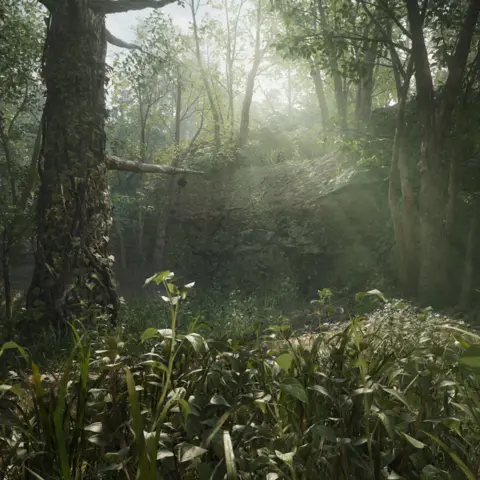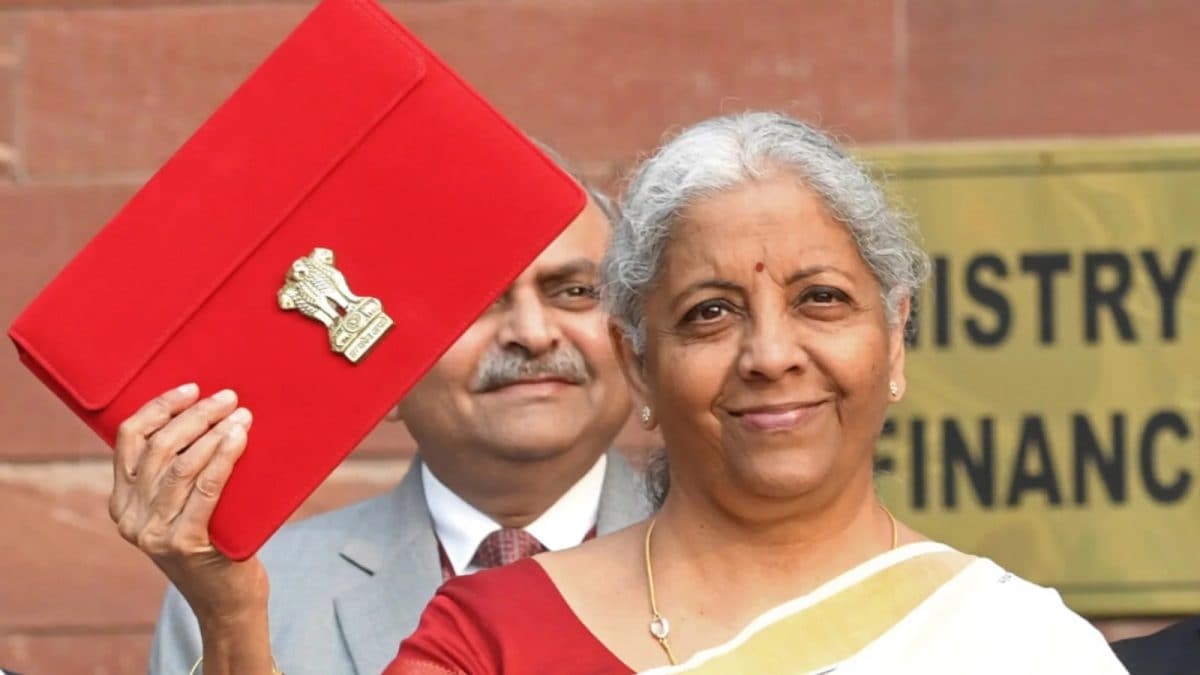Business
Metal Gear Solid back with remake years after Kojima left Konami

Tom GerkenTechnology reporter
 Konami
KonamiMetal Gear is one of the best-selling video game series in history, shifting more than 60 million copies.
The series pioneered cinematics in gaming by blending cutting-edge cutscenes, voice acting and dynamic camera angles to create something that would have looked more at home on the big screen at the time.
Metal Gear tackled themes not commonly seen in games, such as nuclear disarmament and child soldiers, and posed philosophical questions while also leveraging offbeat humour.
The games would often break the fourth wall and ask players to find solutions to puzzles in unusual ways – such as looking on the back cover of the game’s physical box.
The series’ significant place in gaming history meant fans were stunned when its creator Hideo Kojima quit game publisher Konami in an acrimonious split in 2015.
One of gaming’s biggest titles was left directionless – and there’s been no game in the best-selling series since.
But now, a decade later, Konami has released a remake of the third game in the series: Metal Gear Solid Delta.
So what happened between Konami and Kojima, and how does the new game hold up without its original creator?
Why did Kojima leave Konami?
“The impact Metal Gear has had on game-making makes it one of the most heralded entertainment franchises in the world, and made Hideo Kojima one of the industry’s most famous creators,” industry expert Christopher Dring told the BBC.
With such success, you might think it was a match made in heaven, but there were issues bubbling under the surface.
While nothing has been said publicly, one generally accepted theory behind the split relates to the spiralling cost of 2015’s Metal Gear Solid V, estimated by some at more than $80m (£59m) – a very significant development cost at the time.
It is not known exactly what happened between Konami and Kojima, but the studio was clearly fed up with the amount of money he was spending to make a single game – with Kojima’s internal studio actually removed from promotional materials for Metal Gear Solid V at the time.
Konami got the game out the door, but it seemed to be scaled back from its original vision despite the high cost, with repeated levels and a third chapter that never emerged.
Even so, the game still received excellent reviews and won several awards, but the rift between company and creator seemed unfixable.
And in an act that proved highly controversial – and perhaps shows how heated things had become behind the scenes – when Metal Gear Solid V won an award, Konami informed the developer he was not allowed to collect it.
 Getty Images
Getty ImagesA few months later, Kojima was gone, and in the years that followed, his former studio pivoted.
“Konami shifted its strategy for a while, away from console games, and focused its efforts on the amusements markets, things like pachinko machines,” Mr Dring said.
“They also focused increasingly on mobile.”
It meant Konami’s other classic franchises like Castlevania and Silent Hill also went without new games for a decade.
Meanwhile, Kojima’s new studio signed a blockbuster deal with Sony to develop the monster hit Death Stranding for PlayStation, followed by a sequel this year.
Why a remake now?
Gaming has pivoted towards remakes in recent years.
High-profile games like Resident Evil 4, Final Fantasy VII and Demon’s Souls, all classics in their day, have been remade with the benefits of modern graphics and game design to big fanfare – and strong sales figures.
“It’s a hugely lucrative and growing sector,” said Mr Dring.
“The industry is getting older, gamers are entering middle age and are nostalgic for classic titles.
Mr Drings points out that one of the best-selling games of the year so far is Elder Scrolls V: Oblivion Remastered, a remake of a classic Role-Playing Game (RPG) from 2007, selling millions of copies since its release in April.
Konami has begun a return to publishing games by focusing in this area, with a Silent Hill remake coming last year and a new Survival Kids game released earlier in 2025.
So it is a potentially lucrative move – but is Metal Gear Solid 3: Snake Eater the right game to remake?
 Konami
KonamiFans of the series told the BBC Metal Gear Solid 3 was chosen for good reason.
YouTuber Zak Ras said there was “immense significance” behind the game.
“Most people will say their favourite entry to the series is either Metal Gear Solid 1 or 3,” he said.
“Story-wise, given that it’s the first prequel set at the very beginning of the series timeline, it’s one of the few entries you can go into completely blind with absolutely no required knowledge of the series, other than very first Metal Gear from 1987.”
Ras said Metal Gear Solid 3 struck a good balance between gameplay and cinematic storytelling, making it a good choice for people who have never played a game in the series before.
For example, the game opens with an introduction heavily influenced by James Bond films, meaning new fans are eased into the series’ weirder elements.
And the brothers behind PythonSelkan Studios – known as Python & Selkan to their 122,000 YouTube subscribers – agreed.
“Completing the game was an incredible experience in itself,” they said. “Snake Eater’s gut-wrenching ending is what stood out most, leaving an impact on us that no other game had ever left before.”
“This game holds a special place in our hearts,” they added.
Metal Gear without Kojima
The brothers said, as lifelong fans of the series, they were “incredibly excited” by the announcement.
The pair are currently playing the remake, and have been “very impressed” by its improved graphics and audio.
They described the game as a “truly a faithful recreation”, adding that it improved “the essence of the original without changing its fundamental structure”.
 Konami
KonamiSo far so good for Metal Gear Solid without Hideo Kojima – which Ras put down to the game being true to the original.
One example he highlights is that the voice performances have been kept the same, and players can choose whether to use the original control scheme or a more modern take.
“There’s no doubt it is Kojima’s directorial ‘genes’ that are being dominantly expressed here,” he said.
“Kojima expressed a desire to move on from Metal Gear since as early as MGS2 and leave the series in the hands of others to continue.
“It may have taken him another 14 years and five director credits for that to happen, but it is now reality.”
And however the remake fares with fans, one household won’t be picking up a new copy – Kojima himself has laughed off the suggestion that he would play the new game.

Business
From Manufacturing To Infra And AI: Capex Boost Flags Off Budget 2026 ‘Reforms Express’

Last Updated:
Budget 2026: FM Nirmala Sitharaman gives a strong push to manufacturing, infrastructure and job creation, while proposing a simpler tax and customs system.

Finance Minister Nirmala Sitharaman presents the Union Budget 2026-27.
Budget 2026 Takeaways: Finance Minister Nirmala Sitharaman on Sunday presented the Union Budget 2026-27, giving a strong push to manufacturing, infrastructure and job creation, proposing a simpler tax and customs regime, and hailing the government’s modernisation drive as a “reforms express”.
The Budget 2026 is anchored around three ‘kartavyas’ — driving growth by enhancing productivity and competitiveness, building people’s capacity, and ensuring inclusive development under the vision of Sabka Saath, Sabka Vikaas.
In her ninth consecutive Budget in Parliament, Sitharaman laid out a multi-pronged strategy to sustain growth amid global uncertainty, including expanding domestic electronics and semiconductor capabilities, de-risking infrastructure projects, skilling India’s youth for emerging technologies, and easing compliance for taxpayers and importers.
Here are the key takeaways from Budget 2026 across manufacturing, infrastructure, skills, AI, taxation and customs duty.
Manufacturing Gets A Boost
Budget 2026 put a special emphasis on the manufacturing landscape in India. The outlay for electronics components manufacturing was raised sharply to Rs 40,000 crore, while new schemes for rare earth magnets, chemical parks, container manufacturing and capital goods seek to reduce import dependency, and strengthen domestic supply chains. Textiles got an integrated, employment-oriented package covering fibres, clusters, skilling and sustainability.
Infrastructure-Led Growth
Infrastructure got a boost with a higher capex allocation and initiatives like a risk guarantee fund to de-risk projects for private developers, new dedicated freight corridors and national waterways, dedicated REITs (real estate investment trusts) for recycling of significant real estate assets of central public sector enterprises (CPSEs), and a seaplane VGF (viability gap funding) scheme.
The Centre’s capital expenditure (capex) target has been increased to Rs 12.2 lakh crore for FY27, up from Rs 11.2 lakh crore earmarked for the current financial year. Moreover, maintaining the fiscal discipline, Sitharaman said the government expects the fiscal deficit to be at 4.3 per cent of the GDP in 2026-27, lower than 4.4 per cent projected for the current financial year.
Tier-II and Tier-III cities were placed at the centre of urban growth via City Economic Regions, backed by reform-linked funding.
“We shall continue to focus on developing infrastructure in cities with over 5 lakh population (Tier II and Tier III), which have expanded to become growth centres,” Sitharaman said in her Budget Speech.
Greater Emphasis On Skilling
The Budget placed renewed emphasis on the services economy as a jobs engine. A high-powered Education-to-Employment and Enterprise Committee will realign skilling with market needs, including the impact of emerging technologies.
Content creation and creative industries get a boost through AVGC labs in schools and colleges, support for animation, gaming and comics, and new institutional capacity for design and hospitality. Tourism-linked skilling, from guides to digital heritage documentation, signals a clear intent to convert culture and content into employment and exports.
“I propose to support the Indian Institute of Creative Technologies, Mumbai in setting up AVGC Content Creator Labs in 15,000 secondary schools and 500 colleges,” FM Sitharaman said. AVGC stands for animation, visual effects, gaming and comics.
AI & Semiconductors Push
Artificial intelligence (AI) was positioned as a cross-sector force multiplier rather than a standalone theme. The Budget provided a push to artificial intelligence (AI) by promoting adoption with governance, agriculture, education and skilling, including proposals for AI-enabled advisory tools for farmers and AI integration in education curricula.
On hardware, the semiconductor strategy expanded decisively under ISM 2.0 (India Semiconductor Mission 2.0), with focus on domestic equipment manufacturing, materials, research centres and workforce development, signalling a long-term commitment to building a resilient chip ecosystem in India.
Taxation, ITR, TDS, TCS
A major structural reform comes with the Income Tax Act, 2025, effective April 1, 2026, containing simpler rules and redesigned forms.
Budget 2026 provided compliance relief for individuals, including extended timelines for revising returns to March 31 from December 31 earlier, staggered ITR due dates, and easier filing of Form 15G/15H through depositories.
Individuals with ITR-1 and ITR-2 returns will continue to file till July 31, and non-audit business cases or trusts are proposed to be allowed time till August 31, according to the Budget Speech 2026-27.
“I propose to extend time available for revising returns from 31st December to up to 31st March with the payment of a nominal fee. I also propose to stagger the timeline for filing of tax returns. Individuals with ITR 1 and ITR 2 returns will continue to file till 31st July and non-audit business cases or trusts are proposed to be allowed time till 31st August,” Sitharaman said.
TDS (Tax deducted at source) rules were clarified for manpower services, while a rule-based system for lower or nil TDS certificates is proposed. TCS rates were cut to 2% for overseas tour packages, education and medical expenses under liberalised remittance scheme (LRS). Litigation is targeted through integrated assessment and penalty orders, lower pre-deposit requirements, and wider immunity provisions.
TDS on the sale of immovable property by a non-resident will be deducted and deposited through resident buyer’s PAN (Permanent Account Number)-based challan instead of requiring TAN (Tax Deduction and Collection Account Number), Sitharaman said.
Customs Duty Tweaks
Customs duty rationalisation continued with a clear focus on domestic manufacturing, energy transition and ease of living. Exemptions have been extended or introduced for capital goods used in lithium-ion batteries, critical minerals processing, nuclear power projects and aircraft manufacturing.
Personal imports will become cheaper with a reduction in duty on goods for personal use from 20% to 10%. Seventeen cancer drugs and additional rare-disease treatments were exempted from customs duty. Process reforms aimed at trust-based, tech-driven clearances, faster cargo movement and lower compliance costs, especially for exporters and MSMEs (micro, small, medium and enterprises).
STT On F&O Hiked
The Budget increased securities transaction tax (STT) on futures trading from 0.02% to 0.05% and on options trading from 0.10% to 0.15%, a move that upset the capital markets with the BSE Sensex crashing more than 2,300 points from the day’s high and the NSE Nifty dropping to 24,571.75.
Securities Transaction Tax (STT) is a direct tax imposed on the buying and selling of securities in India.
Commenting on the Budget, Prime Minister Narendra Modi said, “The Union Budget reflects the aspirations of 140 crore Indians. It strengthens the reform journey and charts a clear roadmap for Viksit Bharat.”
February 01, 2026, 14:43 IST
Read More
Business
Air India resumes direct Shanghai-New Delhi flights after nearly six years

Shanghai (China): The Consulate General of India in Shanghai welcomed the resumption of Air India’s direct flight services between Shanghai and New Delhi, marking a major step forward in restoring people-to-people, business and institutional connectivity between India and China.
According to an official release, the inaugural Shanghai-New Delhi flight departed today from Shanghai Pudong International Airport, carrying over 230 passengers on board the Boeing 787 aircraft. The relaunch comes after a gap of nearly six years and represents a significant milestone in normalising bilateral air connectivity following the suspension of services in early 2020.
Speaking on the occasion, Consul General Pratik Mathur said, “The resumption of direct flights between Shanghai and New Delhi is a tangible expression of the renewed momentum in India-China engagement. Enhanced air connectivity is essential for facilitating trade, tourism, academic exchanges and people-to-people contacts, particularly between India and East China. We are pleased to see Air India restoring this important link.”
As per a release, Air India will operate the route four times a week using its Boeing 787-8 Dreamliner aircraft, featuring modernised cabins and enhanced onboard services. The restored service reflects the growing demand for travel between the two countries and the steady recovery of cross-border mobility. It will also support commercial, educational and cultural exchanges between India and the Yangtze River Delta region, one of China’s most economically dynamic clusters.
The Consulate General of India in Shanghai remains committed to supporting initiatives that strengthen connectivity and deepen cooperation across trade, investment, tourism, education and cultural exchange, the release stated.
Business
‘Holistic And Forward-Looking’: Piyush Goyal Says Budget 2026 Reflects Future-Ready India

Last Updated:
Piyush Goyal termed the Budget “economically and fundamentally very strong”, and stated that it “reflects the aspirations of the youth of the country”.

Minister of Commerce and Industry Piyush Goyal. (File photo)
Union Minister Piyush Goyal on Sunday termed Budget 2026 “futuristic and holistic”, and stated that it “reflects the aspirations of the youth of the country and is forward-looking”.
Speaking exclusively to CNN-News18 on Budget 2026, presented by Finance Minister Nirmala Sitharaman, Goyal said, “This is a fabulous budget and it is very futuristic. The Budget 2026 has covered all sectors including technology, infrastructure, etc.”
“The technology sector has been given a thrust. The budget focuses on infrastructure. It is a holistic and forward-looking budget refecting future ready Bharat,” he said, adding, “The budget meets the aspirations of the youth and new India.”
Stating that the Budget is economically and fundamentally very strong, the Union Minister said, “Farmers, animal husbandry and labour-intensive sectors get a major push as this Budget focuses on investment, value addition and jobs.”
#Exclusive | “The Budget is economically and fundamentally very strong,”Preparing India for Viksit Bharat. Farmers, animal husbandry and labour-intensive sectors get a major push as the Budget focuses on investment, value addition and jobs.@Parikshitl in an exclusive… pic.twitter.com/tJr2SItcaW
— News18 (@CNNnews18) February 1, 2026
‘Budget 2026 Is Human-Centric’: PM Modi
Prime Minister Narendra Modi on Sunday said that the Union Budget 2026 is “human-centric and strengthens India’s foundation with path-breaking reforms.” The Prime Minister also described it as historic and a catalyst for accelerating the country’s reform trajectory and long-term growth.
Following the presentation of the Budget in Parliament, PM Modi said the proposals would energise the economy, empower citizens and give India’s youth fresh opportunities to scale new heights.
“This budget brings the dreams of the present to life and strengthens the foundation of India’s bright future. This budget is a strong foundation for our high-flying aspirations of a developed India by 2047,” he said.
Calling the government’s reform agenda a “Reform Express”, the Prime Minister added, “The reform express that India is riding today will gain new energy and new momentum from this budget.”
February 01, 2026, 19:01 IST
Read More
-

 Sports5 days ago
Sports5 days agoPSL 11: Local players’ category renewals unveiled ahead of auction
-

 Entertainment1 week ago
Entertainment1 week agoThree dead after suicide blast targets peace committee leader’s home in DI Khan
-

 Tech1 week ago
Tech1 week agoThis Mega Snowstorm Will Be a Test for the US Supply Chain
-

 Entertainment5 days ago
Entertainment5 days agoClaire Danes reveals how she reacted to pregnancy at 44
-

 Fashion1 week ago
Fashion1 week agoSpain’s apparel imports up 7.10% in Jan-Oct as sourcing realigns
-

 Tech1 week ago
Tech1 week ago‘Uncanny Valley’: Donald Trump’s Davos Drama, AI Midterms, and ChatGPT’s Last Resort
-

 Tech1 week ago
Tech1 week agoICE Asks Companies About ‘Ad Tech and Big Data’ Tools It Could Use in Investigations
-

 Sports5 days ago
Sports5 days agoCollege football’s top 100 games of the 2025 season






